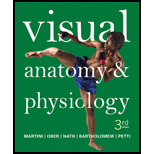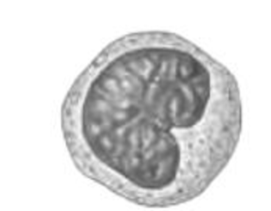
Concept explainers
Introduction: White blood cells (WBCs) are immune cells that play a major role in the body’s defense mechanism. WBCs, also known as leukocytes, protect the body from foreign antigens and infectious diseases. The five types of white blood cells are neutrophils, basophils, eosinophils, lymphocytes, and monocytes.
Answer to Problem 1CRQ
Pictorial representation: The given figure is labeled as a monocyte.

Fig.1: Monocyte
Explanation of Solution
In the immune system, monocytes are one of the crucial white blood cells. Monocytes are amoeboid in structure and possess non-granulated cytoplasm; hence, they are termed as agranulocytes. They differentiate into macrophages. If an infection or tissue damage happens, the monocytes leave the blood and reach the affected area (tissue) and undergo a sequence of changes to become macrophages. They are also involved in the tissue repair mechanism.
Want to see more full solutions like this?
Chapter 17 Solutions
Visual Anatomy & Physiology Plus Mastering A&P withPearson eText -- Access Card Package (3rd Edition) (New A&P Titles by Ric Martini and Judi Nath)
- Activation of the vascular endothelium is an important event associated with cardiovascular diseases. Explain why. (minimum 60 words)arrow_forwardTo review: The following regarding the blood components: (a) The three main categories of formed elements. (b) The least numerous categories of the formed elements. (c) The category comprising the buffy coat in hematocrit tube.arrow_forwardState main function of thrombocytes.arrow_forward
- Label the components of the blood as indicated in the histological image below.arrow_forwardList the agranular and granular leucocyte cells found in blood, include a defining feature and one function.arrow_forwardA. How is the blood in the pulmonary artery and pulmonary veins different from the blood in the other arteries veins? B. Describe one SIMILARITY and one STRUCTURAL DIFFERENCE between AORTA and VENA CAVA .arrow_forward

